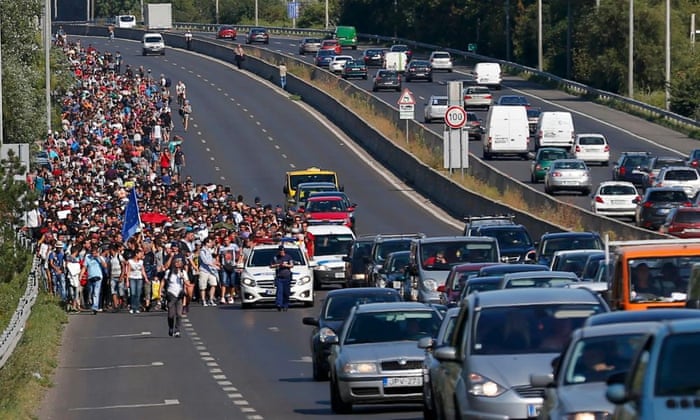
Hundreds march on foot for the border with Austria from Budapest. Photograph: Laszlo Balogh/Reuters
Hungary will transport thousands of refugees by bus to the Austrian border, a spokesman for prime minister Viktor Orban said on Friday night.
The buses will be sent to pick up the thousands of migrants at Budapest’s main railway
terminus and the approximately 1,200 who are walking along the main westward motorway towards Austria, chief of staff János Lázár told a news conference.
“This does not automatically mean that they can leave the country,” he said. “We are waiting for the Austrian government’s response.”
Lazar’s announcement came as the estimated 1,200 people – young and old, some in wheelchairs or on crutches, others barefoot, some with children in buggies, others with toddlers on their shoulders – set off to walk the 105 miles from Budapest’s main railway station to Austria, as Europe’s worst refugee crisis since the second world war deepened.
Snaking through the city in a line nearly half a mile long, the column was one of at least three groups of desperate, mainly Syrian refugees and migrants blocked by Hungarian authorities from travelling by train to Austria and Germany, who decided on Friday to take their fate in their hands and attempt the journey by foot.
“There was one toilet for each thousand people,” said Moaz, aconfectioner from Syria, travelling with seven members of his family. “It was such a bad situation in the station that I would rather just end up in the forest.” Reen, a young mother, asked simply: “What else can we do?”
Thirty miles north-west of Budapest, up to 350 of 500 refugees stranded for more than 24 hours on a train at the town of Bicske were also on the move, breaking through a police cordon to begin the long walk westwards.
Taken by surprise, riot police were able to stop only a few of those people on board from fleeing, Associated Press reported. A Pakistani man reportedly died when he fell and hit his head on the tracks during the breakout.

But the carriages were halted less than half an hour after leaving the capital by security forces, who tried to move the refugees to a nearby processing camp. For much of Friday, they refused to budge, turning away offers of water, fruits and sweets and shouting “No food! No food!” in protest.
“The situation is so bad,” said Adnan Shanan, 35, from Latakia in Syria, who said he was fleeing war in his homeland. “We have many sick people on the train. We have pregnant women, no food, no water. We don’t need to stay here one more day. We need to move on to Munich, to anywhere else. We can’t stay here. We can’t wait until tomorrow.”
A group of 64 migrants broke out of the camp at Bicske on Friday, while Hungary’s main border crossing with Serbia was closed temporarily after about 300 of the 2,300 people in the nearby Röszke holding centre escaped through a fence. “In the interest of preventing accidents, the Röszke motorway border crossing has been closed to incoming traffic and traffic is being redirected,” police said.
In Budapest, parliament passed a series of laws effectively sealing Hungary’s southern border to migrants – about 140,000 of whom have crossed it so far this year – and creating “transit zones” to hold asylum seekers until their asylum requests are approved and deported if not.
New laws will make it a criminal offence to cross or damage Hungary’s controversial new razor-wire fence along its 108-mile border with Serbia and make illegal border crossings punishable by up to three years in prison.
“Today we are talking about tens of thousands, but next year we will be talking about millions and this has no end,” he said.
“We have to make it clear that we can’t allow everyone in, because if we allow everyone in, Europe is finished. If you are rich and attractive to others, you also have to be strong because if not, they will take away what you have worked for and you will be poor, too.”
Hungary has sharply criticised Germany, which expects to receive 800,000 asylum seekers this year, for saying it would accept requests from Syrians regardless of where they entered the European Union, contrary to EU rules.

Some families have pitched tents and painted signs demanding to be allowed to continue their journeys, while children played football nearby.
Abdel Aziz, from Syria, said: “People are starting to be more nervous and angry. They are losing money day by day so the situation will become more complicated and we’ll see some more problems.”
Those who set off on the march to Austria, though, were convinced it was their best option. As the column streamed through downtown Budapest past shocked, bemused and horrified Hungarians, one shopper wept silently, mascara streaming down her face, as children struggled by.
An elderly woman silently pressed a blanket into the hands of a passing Syrian mother and a young woman distributed bank notes until she had none left. Not everyone was so sympathetic though. A driver screamed at a group crossing on a red light. “Can’t you see you have to wait,” he said, as they raced after relatives ahead.

“This way to Austria,” said one policewoman at a motorway junction where traffic was picking up after the main column passed, directing the struggling men, women and families onto a concrete flyover. None of the passing vehicles had room for anyone from the column.
“Just one kilometre, please,” Amal, a teacher from Damascus pleaded with a Hungarian couple driving a small van slowly down the motorway behind the column.
Her six-year-old son, Sohaib, and eight-year-old daughter, Bisan, could not walk fast enough, and she was worried about losing the protection of the group, or losing her way entirely. “We are human, too,” Amal pleaded, but the driver refused, saying Hungarian police would arrest them
No comments:
Post a Comment